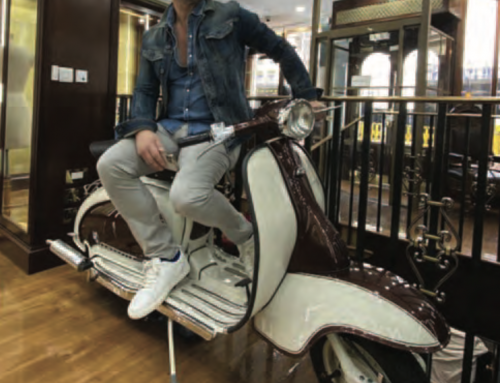In these asset-rich, cash-strapped times, more and more of us are banking on a new breed of high-end moneylenders. Kathryn Knight investigates
When Tiffany Jackson’s husband James was made redundant from his job in the City last year the couple quickly felt the pinch. They put their six-bedroom home in Weybridge, Surrey, on the market, but while they waited for it to sell, money was tight. ‘A couple of credit-card bills came in,’ recalls Tiffany. ‘Normally it wouldn’t be a problem with my husband’s salary, but we were struggling.’
Traditionally, the solution might have been a bank loan, or a begging phone call to friends. Instead, Tiffany, 32, a housewife who is used to dressing in designer labels, took a different tack. ‘A friend suggested I pawn a couple of my more expensive items. Initially I was taken aback because I’d never come across the idea before – you associate the word with the seedier end of the high street. But it made sense. I may not have much going into my bank account, but I had a wardrobe full of expensive stuff. The shop she mentioned was just down the road, so I decided I had nothing to lose by going in.’
The following day, Tiffany found herself in the offices of a pawnbroker handing over an £18,000 crocodile-skin Chanel handbag – a present from her husband – and her £6,000 Rolex watch. In return, she got a cheque for £4,000 – enough to settle the credit-card bills that were worrying her. She has seven months to repay the money at a monthly interest rate of around five per cent, meaning she will need to find more than £5,400 to get her items back. However, she is confident that the imminent sale of her house will free up her cash. ‘But if it doesn’t, although I loved my watch and bag, there are worse things to lose,’ she says. ‘As long as you’re not emotionally attached to whatever you’re handing over it’s a stress-free way to get cash.’
Women such as Tiffany are not the sort of clientele that you traditionally associate with pawnbrokers. Nevertheless, in these asset-rich, cash-poor times they are increasingly emerging as their lender of choice. Last year, the National Pawnbrokers Association – whose membership has grown from 530 to 1,800 in the past five years – reported a 15 per cent rise in business, in part fuelled by this new breed of high-end customer. Then there’s the internet, where online brokers offer loans against everything from jewellery to fine wine. At borro.com loans of up to £1 million are available, while at pawnbrokeronline.co.uk applicants can be offered money after a transaction lasting as little as a minute.
Meanwhile, over at Prestige Pawnbrokers in Weybridge (a commuter belt with some of the UK’s most expensive houses) designer handbags and dresses – Hermès, Chanel, Dior – jostle for space with expensive jewellery in the locked units behind the discreet shop front that, with its plain counter and sofas, looks more like a bank. The most interesting stuff isn’t on the premises, but in underground vaults containing rare books and paintings, and secure garages that host sleek rows of prestige cars. All of them have been pawned by their owners in exchange for ready cash.
Moreover, it is women who are helping to fuel James’s booming business. ‘When we opened women rarely came in unaccompanied by a man, but we’ve seen a huge shift in that sector. Now they form around 65 per cent of our client base. Before, these women could have walked into the bank and said, “My house is worth five million, I just want a few grand on my bank card”, and that would have been fine, but now that’s not possible unless you’re in full-time employment, which doesn’t apply for many of these women. So they come here.’ What are they spending the money on? Anything, it seems – school fees, dentistry work, credit-card bills, even to start their own business.
‘If you’re not attached to what you hand over, it’s stress-free cash’
The rise in popularity of pawnbrokers doesn’t come as a surprise to those in the know either. Jasmine Birtles, personal finance expert from moneymagpie.com, agrees that the industry has now attracted a new kind of client – the ‘secretly poor’. ‘These are the people who appear to be doing well – the children in private school, the expensive cars on the drive – but behind the scenes they have cash-flow problems, which means they are behind on the mortgage and can’t get any money from the bank. For them, the sort of discreet service offered by a pawnbroker can be an attractive proposition.’
A pawnbroker typically lends up to 50 per cent of the value of the item on a seven-month contract, with interest rates set at anything from 1.49 to nine per cent each month (compared with an average 19.5 per cent annually on a bank overdraft and 17.3 on a credit card). The contract is redeemable at any point, but if the customer can’t repay the loan plus interest at the end of the term, the pawnbroker keeps the items and sells them to recoup the value of the loan – either through their own shop or via auction houses and specialist dealers. Nonetheless, James insists that customers know exactly what they’re signing up for. ‘There are no hidden charges,’ he says. ‘And for the first three months our terms are not dissimilar to a bank, especially when you factor in the fact that we have no arrangement fee.’
James will consider anything of worth, using a team of specialists to assess an item’s value. A Lowry painting, a Picasso and a rare book collection worth half a million have all passed over his counter, latterly joined by two rare vintage wedding dresses. They belonged to 45-year-old single mother Stella Brody, who pawned her dresses to buy stock for her antiques business when her bank refused her a loan. ‘My supplier had new goods, so I needed to act quickly,’ she says. ‘Someone suggested the pawnbrokers and the wedding dresses sprang to mind.’ One was Elizabeth Arden and one Dior, the former belonging to her mother and the latter originally for sale in her shop. ‘I didn’t want to part with them, but I knew that once I got my new stock I’d recoup my money quickly and I was right. I was given £7,000 and three months later, I was able to go in and pay £8,000 to get them back. It’s high interest, but I viewed it as a short-term cash injection that enabled me not only to survive but to thrive.’
‘Some customers come back with the same item two or three times’
According to James most customers, like Stella, hope to see their goods again. ‘With smaller items such as jewellery, 60 to 70 per cent of owners come back, while on bigger items, such as cars, it’s 85 to 90 per cent.’ Like most pawnbrokers, he prefers to return items than sell on. ‘If we have to sell we’ve effectively lost a client,’ he says. ‘Whereas we get customers who come back and pawn the same items two or three times whenever they need a short-term injection of cash.’
Nor is Stella the first woman to turn to the pawn merchants to help her business (in 1971, Diane von Furstenberg famously pawned a diamond ring to launch her now iconic wrap dress). However, not everyone is keen to bang the drum for this new breed of lending, among them Jasmine Birtles, who cautions against anyone relying on it too heavily. ‘In general, I am not pro the pawnbroking industry as there are a number of dodgy dealers out there and interest rates are high,’ she says. ‘They’re not as dangerous as taking out a payday loan, but I would advise people to go in with your eyes open and only if you think cheaper options are not available to you.’
Nonetheless, for some women, a visit to the pawnbroker has proved not only useful but strangely liberating. ‘There’s certainly no shame in it,’ says Tiffany Jackson. ‘It’s not our fault we ended up in the situation we did, but this way I feel I am taking control my own way.’
‘I pawned my watches to expand my small company’
Jane Wall-Budden, a 29-year-old mother of two from Byfleet, Surrey, recently pawned two watches, a Cartier and a Rolex, and used the £3,000 she got for them to inject cash into her own growing business, Bumpsters, which markets custom-made cot bumpers. ‘I needed a cash injection to invest in a new product, which I felt would market well with my own invention. It made good business sense, but the bank just saw me as a little cottage industry and weren’t interested.’ The watches were languishing in her bedside table drawer. ‘Frankly, it was the only way I could get my hands on a lump sum. I would say to anyone who was in the same position and had something lying around that wasn’t of huge personal value to do the same.’
‘I used my Chanel and Hermès bags to raise money to fix my bathroom’
‘Money has been tight since I got divorced,’ says Lorraine Giacomelli, a mother of two from Richmond, Southwest London, ‘and when my bathroom flooded earlier this year I didn’t have the funds to fix it. I wasn’t covered by my insurance, and while I could have got a loan or used a credit card I didn’t want to be in debt — which is why I didn’t ask my ex-husband either.
‘He had been very generous while we were married and a friend pointed out that I probably had thousands of pounds’-worth of goods tucked away that I could pawn. So I rooted through my wardrobe and found a pair of £1,000 Christian Louboutin shoes, a £2,000 Chanel handbag and a Hermès bag that had originally cost £17,000.
‘At the pawnbrokers I was offered £4,000 for the lot, at a monthly interest of five per cent. I knew that designer bags go in and out of fashion so I didn’t expect an enormous amount for the Hermès relative to what it had originally cost. The important thing was that it was enough to fix my bathroom. Although I am a stay-at-home mum, with careful budgeting I’m confident I can raise the money to get them back — and if I don’t and I lose the bags and shoes, I won’t be totally heartbroken. That’s why it’s a win-win situation — I got the money I needed and I’m not left in debt in real terms. I felt quite proud that I didn’t have to ask anyone for money. I’d do it again in a heartbeat if I had to.’



